-
 Bitcoin
Bitcoin $84,705.5206
1.96% -
 Ethereum
Ethereum $1,882.8342
2.59% -
 Tether USDt
Tether USDt $0.9999
-0.02% -
 XRP
XRP $2.1020
-0.02% -
 BNB
BNB $603.8511
-0.82% -
 Solana
Solana $124.7702
-1.25% -
 USDC
USDC $0.9999
-0.01% -
 Dogecoin
Dogecoin $0.1717
1.76% -
 Cardano
Cardano $0.6717
0.25% -
 TRON
TRON $0.2380
0.73% -
 Toncoin
Toncoin $3.9856
-3.94% -
 Chainlink
Chainlink $13.7866
0.95% -
 UNUS SED LEO
UNUS SED LEO $9.4087
2.25% -
 Stellar
Stellar $0.2691
1.18% -
 Avalanche
Avalanche $19.3533
1.55% -
 Sui
Sui $2.3689
0.72% -
 Shiba Inu
Shiba Inu $0.0...01244
-1.74% -
 Hedera
Hedera $0.1666
1.40% -
 Polkadot
Polkadot $4.1088
0.73% -
 Litecoin
Litecoin $83.2182
-0.74% -
 MANTRA
MANTRA $6.2222
-1.29% -
 Bitcoin Cash
Bitcoin Cash $306.0723
0.08% -
 Bitget Token
Bitget Token $4.6091
0.13% -
 Dai
Dai $1.0000
0.02% -
 Ethena USDe
Ethena USDe $0.9999
-0.01% -
 Pi
Pi $0.6919
-3.31% -
 Hyperliquid
Hyperliquid $13.1957
-3.08% -
 Monero
Monero $219.3099
1.05% -
 Uniswap
Uniswap $6.1691
2.09% -
 Pepe
Pepe $0.0...07614
3.60%
Is a Bitcoin ETF OK to Buy in a Retirement Account?
Consider Bitcoin ETFs for your retirement account carefully, focusing on risk tolerance, plan rules, and diversification to balance potential growth with volatility.
Mar 27, 2025 at 07:21 pm
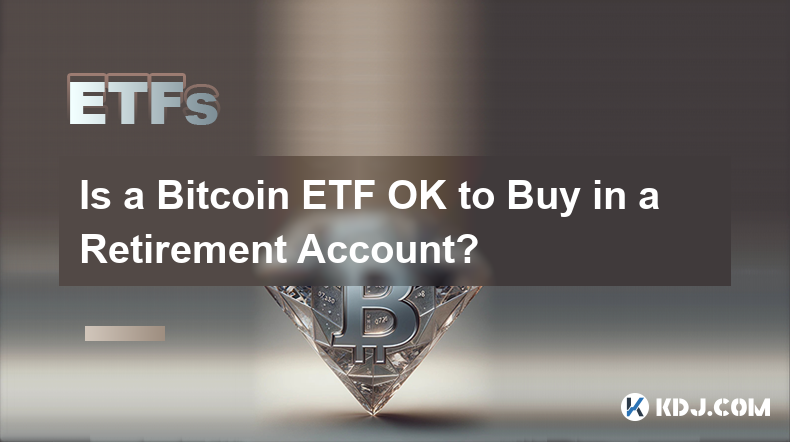
Navigating Bitcoin ETFs in Retirement Accounts
The question of whether a Bitcoin ETF is suitable for a retirement account hinges on several factors, primarily your risk tolerance, investment goals, and the specific rules governing your retirement plan. While the allure of Bitcoin's potential growth is undeniable, it's crucial to understand the inherent volatility before integrating it into your long-term savings strategy. This volatility is a significant consideration when planning for retirement, where stability is typically prioritized.
Investing in a Bitcoin ETF within a retirement account presents both opportunities and challenges. The opportunity lies in the potential for high returns, mirroring Bitcoin's historical price fluctuations. However, the challenge stems from the significant risk associated with this highly volatile asset. A sudden market downturn could severely impact your retirement savings if a substantial portion is allocated to Bitcoin.
The suitability of a Bitcoin ETF for your retirement account depends heavily on your personal circumstances. Factors to consider include your age, retirement timeline, and overall investment portfolio diversification. Younger investors with a longer time horizon might tolerate higher risk, while those nearing retirement generally prefer more conservative strategies. Diversification is key; don't put all your retirement eggs in one (Bitcoin) basket.
Many retirement accounts, such as 401(k)s and traditional IRAs, have restrictions on what types of investments are permitted. Check your plan's prospectus carefully to confirm whether Bitcoin ETFs are allowed. Some plans may explicitly prohibit investments in cryptocurrencies, while others might have limited allowances. Ignoring these rules could lead to penalties.
If your retirement plan permits Bitcoin ETF investments, you'll need to determine how to purchase them. This typically involves working through your plan's brokerage platform. The process is generally similar to buying other ETFs, though you may need to locate the specific Bitcoin ETF offered within your plan's investment options. Always review the fees associated with the ETF and the trading platform.
The tax implications of Bitcoin ETF investments within a retirement account vary depending on the type of account. For traditional IRAs, gains are taxed upon withdrawal in retirement. Roth IRAs offer tax-free withdrawals in retirement, but contributions are made with after-tax dollars. Consult a financial advisor to understand the tax implications specific to your situation and chosen retirement account.
Before making any investment decisions, consider the potential risks. Bitcoin's price is notoriously volatile, influenced by various factors including regulatory changes, market sentiment, and technological developments. A significant price drop could negatively impact your retirement savings. Thorough research and understanding of the risks involved are crucial before investing.
Understanding the regulatory landscape surrounding Bitcoin ETFs is also vital. The regulatory environment for cryptocurrencies is constantly evolving, and changes could significantly impact the value of your investment. Keep abreast of any regulatory developments that may affect Bitcoin ETFs.
Diversification remains a cornerstone of sound retirement planning. While Bitcoin ETFs offer potential growth, they shouldn't constitute your entire retirement portfolio. A balanced portfolio, incorporating a mix of asset classes, is generally recommended to mitigate risk. This could include traditional investments such as stocks, bonds, and real estate.
The decision to include a Bitcoin ETF in your retirement account is a personal one, depending on your risk tolerance, investment goals, and understanding of the cryptocurrency market. Always seek professional financial advice before making any significant investment decisions, especially those impacting your retirement savings.
Step-by-Step Guide (If Permitted by Your Plan):
- Identify Eligible Bitcoin ETFs: Check your retirement plan's list of approved investments to find available Bitcoin ETFs.
- Review ETF Details: Carefully examine the prospectus for fees, expense ratios, and investment strategy.
- Determine Allocation: Decide what percentage of your retirement portfolio you'll allocate to the Bitcoin ETF.
- Place the Trade: Use your retirement account's online platform to purchase the desired number of ETF shares.
- Monitor Performance: Regularly track the performance of your Bitcoin ETF investment.
Frequently Asked Questions
Q: Are Bitcoin ETFs available in all retirement accounts?
A: No, many traditional retirement accounts, like 401(k)s and some IRAs, may not allow cryptocurrency investments, including Bitcoin ETFs. Check your plan's specific rules.
Q: What are the risks of investing in a Bitcoin ETF in a retirement account?
A: The primary risk is Bitcoin's price volatility. A significant price drop could severely impact your retirement savings. Regulatory changes also pose a risk.
Q: How do taxes work with Bitcoin ETF investments in retirement accounts?
A: Tax implications depend on the account type (Traditional IRA vs. Roth IRA). Consult a tax professional for specific guidance.
Q: Should I invest all my retirement savings in a Bitcoin ETF?
A: Absolutely not. Diversification is key. A Bitcoin ETF should be a small part of a larger, well-diversified portfolio.
Q: What if the Bitcoin ETF I invested in performs poorly?
A: This is a risk of any investment. Diversification helps mitigate losses, but some losses are still possible.
Q: How often should I monitor my Bitcoin ETF investment?
A: How often you monitor depends on your risk tolerance. Regular monitoring is recommended, but don't obsess over daily fluctuations.
Q: Where can I find more information about Bitcoin ETFs?
A: Reputable financial news sources, brokerage websites, and financial advisors can provide valuable information. Always do your research.
Disclaimer:info@kdj.com
The information provided is not trading advice. kdj.com does not assume any responsibility for any investments made based on the information provided in this article. Cryptocurrencies are highly volatile and it is highly recommended that you invest with caution after thorough research!
If you believe that the content used on this website infringes your copyright, please contact us immediately (info@kdj.com) and we will delete it promptly.
- Santiment Released Data Offering Insights for Spotting Market Dips
- 2025-04-02 11:35:12
- Have You Ever Wondered What It Would Be Like to Invest in the Next Big Meme Coin Before It Skyrockets?
- 2025-04-02 11:35:12
- Circle, the company behind the USDC stablecoin, has filed for an initial public offering and plans to list its shares on the New York Stock Exchange
- 2025-04-02 11:30:12
- Circle, the company behind USDC stablecoin, has filed for an initial public offering and plans to list on the New York Stock Exchange
- 2025-04-02 11:30:12
- Circle, the company behind the USDC stablecoin, has filed for an initial public offering and plans to list on the New York Stock Exchange.
- 2025-04-02 11:25:12
- Hyperliquid's Centralized Twist Exposes the Paradox of Decentralized Finance
- 2025-04-02 11:25:12
Related knowledge
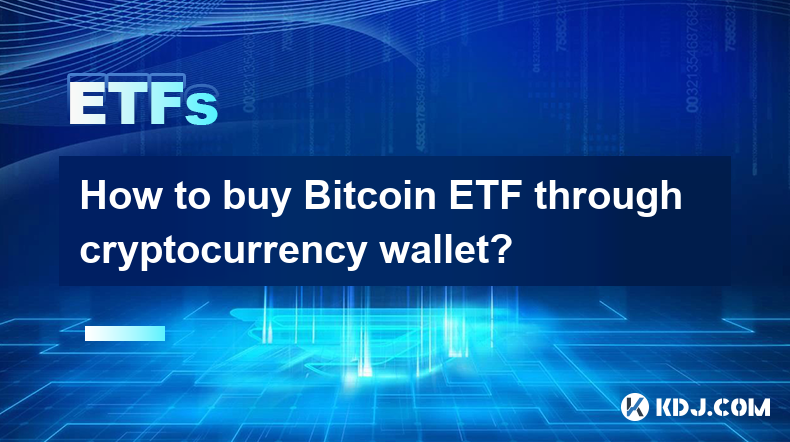
How to buy Bitcoin ETF through cryptocurrency wallet?
Mar 30,2025 at 08:22pm
It's important to understand that you cannot directly buy a Bitcoin ETF through a cryptocurrency wallet. Cryptocurrency wallets are designed to hold and manage digital assets like Bitcoin itself, not exchange-traded funds (ETFs). Bitcoin ETFs are traded on traditional stock exchanges, not decentralized cryptocurrency exchanges. Therefore, the process i...
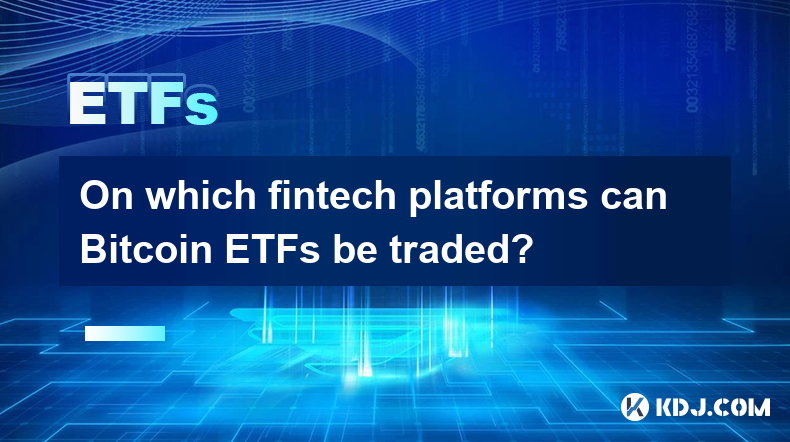
On which fintech platforms can Bitcoin ETFs be traded?
Mar 28,2025 at 09:21am
Navigating the Bitcoin ETF Landscape on Fintech PlatformsThe availability of Bitcoin ETFs on fintech platforms is a rapidly evolving landscape. Currently, the approval and subsequent listing of Bitcoin ETFs are subject to regulatory hurdles and vary significantly by jurisdiction. Therefore, the specific platforms offering Bitcoin ETF trading depend hea...
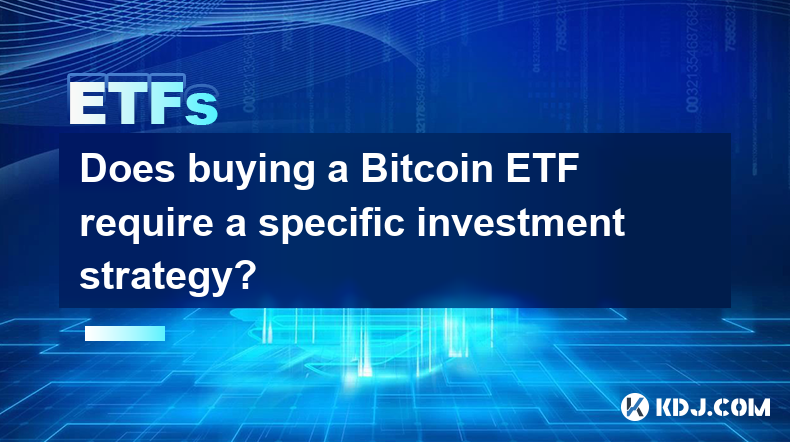
Does buying a Bitcoin ETF require a specific investment strategy?
Mar 27,2025 at 06:36pm
Understanding Bitcoin ETFs and Investment StrategiesA Bitcoin Exchange-Traded Fund (ETF) is a type of investment fund that tracks the price of Bitcoin. Investing in a Bitcoin ETF offers exposure to the cryptocurrency market without the complexities of directly owning and securing Bitcoin. However, like any investment, a successful strategy requires car...
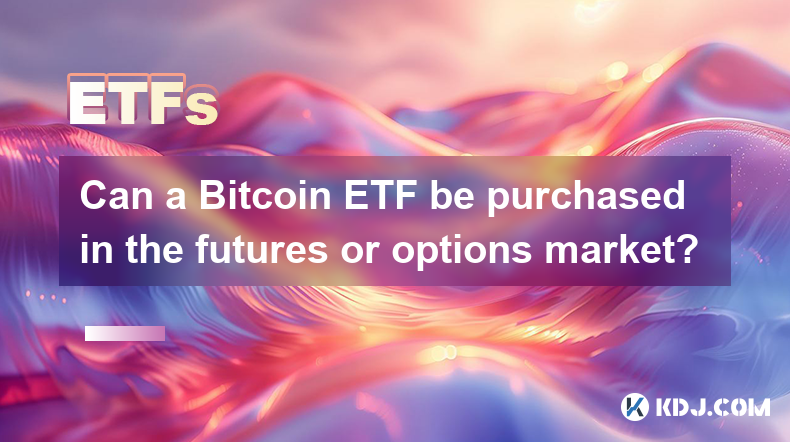
Can a Bitcoin ETF be purchased in the futures or options market?
Mar 27,2025 at 02:49am
Understanding Bitcoin ETFs and Derivative MarketsA Bitcoin ETF (Exchange-Traded Fund) is a fund that tracks the price of Bitcoin. Unlike directly buying Bitcoin, an ETF offers a more regulated and accessible way for investors to gain exposure to the cryptocurrency market through traditional brokerage accounts. However, the availability of a Bitcoin ETF...

How to buy Bitcoin ETF through social trading platform?
Mar 27,2025 at 10:43am
How to Buy Bitcoin ETF Through Social Trading Platforms? Understanding Bitcoin ETFs and Social TradingA Bitcoin ETF (Exchange-Traded Fund) is a fund that tracks the price of Bitcoin. Unlike directly buying Bitcoin, an ETF offers a regulated and potentially less volatile way to gain exposure to the cryptocurrency market. This is because ETFs are traded o...
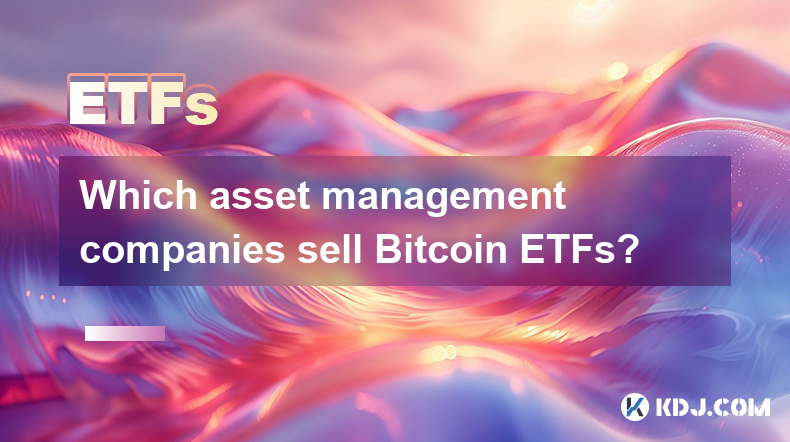
Which asset management companies sell Bitcoin ETFs?
Mar 28,2025 at 02:21am
The Current Landscape of Bitcoin ETF OfferingsCurrently, no asset management company offers a fully-fledged, SEC-approved Bitcoin ETF in the United States. While several companies have filed applications, the Securities and Exchange Commission (SEC) has yet to approve any. This is primarily due to concerns surrounding market manipulation, investor prot...

How to buy Bitcoin ETF through cryptocurrency wallet?
Mar 30,2025 at 08:22pm
It's important to understand that you cannot directly buy a Bitcoin ETF through a cryptocurrency wallet. Cryptocurrency wallets are designed to hold and manage digital assets like Bitcoin itself, not exchange-traded funds (ETFs). Bitcoin ETFs are traded on traditional stock exchanges, not decentralized cryptocurrency exchanges. Therefore, the process i...

On which fintech platforms can Bitcoin ETFs be traded?
Mar 28,2025 at 09:21am
Navigating the Bitcoin ETF Landscape on Fintech PlatformsThe availability of Bitcoin ETFs on fintech platforms is a rapidly evolving landscape. Currently, the approval and subsequent listing of Bitcoin ETFs are subject to regulatory hurdles and vary significantly by jurisdiction. Therefore, the specific platforms offering Bitcoin ETF trading depend hea...

Does buying a Bitcoin ETF require a specific investment strategy?
Mar 27,2025 at 06:36pm
Understanding Bitcoin ETFs and Investment StrategiesA Bitcoin Exchange-Traded Fund (ETF) is a type of investment fund that tracks the price of Bitcoin. Investing in a Bitcoin ETF offers exposure to the cryptocurrency market without the complexities of directly owning and securing Bitcoin. However, like any investment, a successful strategy requires car...

Can a Bitcoin ETF be purchased in the futures or options market?
Mar 27,2025 at 02:49am
Understanding Bitcoin ETFs and Derivative MarketsA Bitcoin ETF (Exchange-Traded Fund) is a fund that tracks the price of Bitcoin. Unlike directly buying Bitcoin, an ETF offers a more regulated and accessible way for investors to gain exposure to the cryptocurrency market through traditional brokerage accounts. However, the availability of a Bitcoin ETF...

How to buy Bitcoin ETF through social trading platform?
Mar 27,2025 at 10:43am
How to Buy Bitcoin ETF Through Social Trading Platforms? Understanding Bitcoin ETFs and Social TradingA Bitcoin ETF (Exchange-Traded Fund) is a fund that tracks the price of Bitcoin. Unlike directly buying Bitcoin, an ETF offers a regulated and potentially less volatile way to gain exposure to the cryptocurrency market. This is because ETFs are traded o...

Which asset management companies sell Bitcoin ETFs?
Mar 28,2025 at 02:21am
The Current Landscape of Bitcoin ETF OfferingsCurrently, no asset management company offers a fully-fledged, SEC-approved Bitcoin ETF in the United States. While several companies have filed applications, the Securities and Exchange Commission (SEC) has yet to approve any. This is primarily due to concerns surrounding market manipulation, investor prot...
See all articles






















































































